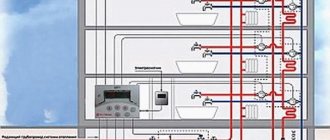Section options
The following should be noted right away: the division of a municipal apartment, in the classical sense, is impossible. It is impossible to divide what belongs to the municipality and not to the persons living in the apartment. But there are ways out of the situation.
They are:
- privatization of housing;
- exchange of municipal housing.
Before implementing any of the above options, you need to think carefully and weigh everything. The main thing is to understand: how to make the division beneficial to everyone, so that everyone agrees to it.
Exchange of owned housing
The exchange of owned housing is formalized by an “exchange agreement” and, in fact, is not much different from a purchase/sale agreement. In practice, an exchange agreement combines two purchase/sale agreements. You often see on the Internet that experts are asked how best to complete a transaction: through barter or buy/sell?
- identification data of the parties to the transaction, while usually (unlike a purchase and sale agreement) the parties are indicated not as “seller” and “buyer”, but as “party A” and “party B” (if there are several co-owners of the property, then each of them is indicated them);
- information about the objects of the transaction, including information about documents confirming ownership rights, as well as information about the cadastral value of the objects;
- the contractual value of the objects, which the parties determine themselves, but from 2020 it should not be less than 70% of the cadastral value;
- the amount of additional payment by one of the parties if the transaction is not equivalent;
- the procedure for mutual settlements and actual transfer of objects.
There is an opinion that with the help of an exchange agreement you can avoid paying tax or somehow minimize it. It's a delusion. When implementing an exchange agreement, the same rules and rates apply as when buying/selling. An attempt to avoid paying tax in the event of an unequal exchange by recognizing the contract prices as equal and the absence of additional payment could previously work, but now it is doomed to failure.
The registration authorities will most likely suspend such a transaction, and if registration does take place, then troubles can be expected from the tax authorities. The only way to slightly reduce the tax is to modestly reduce the contract value in the amount of no more than 30% of the cadastral value. But today, in 2020, the cadastral value in most cases already significantly exceeds the real market value.
The exchange agreement is not subject to mandatory notarization. But if the parties wish, they can do this, which will cost approximately 0.15-0.3% of the cost of the more expensive object of the transaction.
Another important point concerns the exchange of shares in the apartment. Here, too, the same laws and rules apply as for the purchase/sale of shares - initially the share must be offered on the same terms for redemption to the co-owners of the apartment. And this must be done not in words, but in official form (letter or telegram). If they refuse, then one month from the date they receive notification of the conditions for the redemption of the share, they can exchange the share with another person.
We suggest you read: Are documents from a driving school valid after changing your last name?
The risks in transactions under barter agreements are similar to the risks in purchase and sale transactions. The contract must be properly executed, ideally registered and documented. The reasons for terminating an exchange agreement or declaring it invalid are the same as for a purchase/sale agreement.
Exchange of municipal housing
If the question is how to divide a municipal apartment into two families, then it is best to implement an apartment exchange. This is not so easy to do, but it is possible.
What is needed for this:
- Obtain the consent of all persons living in the apartment for the exchange. If among these persons there are disabled people, children, etc., then you need to enlist the support of the guardianship authorities.
- Select an option for exchange. Perhaps the most difficult stage. You need to find municipal housing that you would be willing to exchange for your existing apartment. Moreover, this housing must meet the needs of family members of the tenant working on the implementation of the exchange.
- Authorize exchanges with municipal authorities dealing with issues related to public housing.
Next is a matter of technology. New social employment contracts are being concluded. Persons who received new apartments and did not take part in privatization have the right to privatize housing. So far, the privatization program has not been curtailed.
Legal assistance on division of an apartment
Consultation in the office and by phone
+7(495) 728-99-14
Help from a lawyer. 18 years of experience in apartment division!
We are working during the quarantine period of 2020! Call.
To implement the plan, you may need the following documents:
- passports of adult residents;
- birth certificates of minors;
- social rental agreement;
- consent of the guardianship authorities to the exchange;
- certificates of disability, etc.
After the exchange is completed, each of the families can think about privatizing their existing housing. Property rights are better than tenant rights.
How to exchange a municipal apartment
A municipal apartment is not the property of the persons living in it. However, it can be exchanged, despite a number of restrictions. Read below about how to do this correctly, without wasting time on unnecessary trips to authorities.
1
Which apartment definitely cannot be exchanged? If she is arrested, she is registered with a special housing fund or a hostel. If the tenants living in the apartment at the time of the exchange are planning to terminate the rental agreement. If the apartment is in a dilapidated condition and it is impossible to live in it, or the house will soon be demolished, it will also not be possible to exchange it. Pay attention to these points to protect yourself from wasting time and money.
2
Prepare your home for exchange - check all communications, wiring, make cosmetic repairs if you consider it necessary. This way, the likelihood of finding someone willing to exchange apartments with you increases significantly.
3
The next step is to look for a suitable option for exchange. You can do this yourself, armed with a newspaper with advertisements and the Internet, or contact a company that specializes in such transactions. Please note that the intermediary will have to pay some amount, usually ten percent of the cost of the apartment. But there is a possibility of a quick selection, since there are not so many municipal apartments left.
4
If an apartment for exchange has been found, then proceed to prepare a set of documents. You will need a statement from the main tenant, which must be signed by all family members, even if they do not live with you. Make copies of the warrant and rental agreement. Request from the housing office an extract from the house register and confirmation of the absence of arrears in payments (certificate or extract).
5
Please note that if incapacitated persons, disabled people or minors live in the apartment, then you will need the consent of the guardianship authorities.
6
If all the previous points are fulfilled, then the exchange participants can sign the exchange agreement. Each party transfers a set of documents along with the signed contract to its landlord. Within ten days, he must make a decision and either agree on the exchange or justify the refusal.
7
After receiving consent, the exchange participants enter into a rental agreement with the new landlord. At this stage, the exchange is considered complete and the parties can move.
As you can see, it is possible to exchange a municipal apartment. But don’t skimp on the services of professionals, because scammers often operate in the real estate market.
Exchange of a municipal apartment for a municipal one
In this article, experts from the RealtyPress.ru portal discuss various methods of apartment exchange, and also provide a list of documents that need to be prepared for the upcoming operation. Goals and means There are a number of reasons that encourage citizens to change their usual place of residence, to exchange their own housing; accordingly, there is not one, but several ways of exchanging real estate, each of which has its own advantages, as well as its own disadvantages: Most often, the need to exchange housing arises if the owner wishes to improve living conditions.
We recommend reading: When You Get a Money Back for Buying an Apartment
Property passed on by inheritance must belong to the testator. But the municipal apartment is not his property, it belongs to the municipality. The testator has the right to own and use the apartment, but he does not have the right to dispose of it, since he is only a tenant. In the event of death, property can be disposed of by drawing up a will.
Step-by-step instruction
First of all, you need to pay attention to the correct procedure for changing housing:
- Obtain the consent of the residents.
- Find a suitable option for exchange.
- Collect a package of documents.
- Obtain permission from the owner to exchange non-privatized housing.
- Conclude an exchange agreement and move to a new home.
- Conclude a new social rental agreement.
We suggest you read: Is it possible to register a child without the consent of the owner?
What does the law say about registering a newborn child? When exchanging a non-privatized apartment, the consent of all legally registered citizens over 14 years of age will be required in writing. The legislation does not impose any requirements for consent. You can express your consent like this:
- by signing a separate document, which will be certified by an administration employee when accepting documents;
- certifying consent from a notary.
To exchange a non-privatized apartment, you need to find suitable alternative housing. Such living space must:
- have non-privatized status;
- conditions must not worsen;
- the standard for providing living space is to comply with local laws (usually at least 12 meters per person).
When exchanging a non-privatized apartment, the full list of documents will look like this:
- application for consent to exchange (the form is developed by the local administration and filled out during the acceptance of documents);
- consent of all residents permission to guardianship;
- certificate of family composition;
- social tenancy agreement or order;
- certificate of absence of debts.
The application and documents are submitted to the local administration, which issues permission for non-privatized exchange in writing within 30 days.
When exchanging a non-privatized apartment, the consent of the owner of the premises is required. The procedure for obtaining it depends entirely on the administrative regulations of a particular municipality. At the request of the employer, a separate written consent for a non-privatized exchange is issued, certified by the signature of the head of the locality. On its basis, an exchange agreement can be concluded.
How to exchange a non-privatized apartment - through an exchange agreement, the parties to which are citizens from one and the other living space. The procedure does not require registration with Rosreestr, since non-privatized premises are not transferred into ownership. Certification from a notary is also not required.
Mandatory items are:
- date and place of document preparation;
- document's name;
- passport details of the parties, their place of actual residence and registration address, contact details;
- name of the living space and specific data on it (cadastral number and cost, size, number of rooms, etc.);
- name of the authorized body for the disposal of such property;
- technical information (from BTI);
- a record of the absence of grounds preventing the transaction;
- a record of acceptance of the premises in a certain condition, as well as the keys to it;
- additional points as agreed by the parties (not contrary to current legislation);
- information about the number of copies;
- information about the parties’ awareness of the meaning and consequences of signing the document;
- details of the parties;
- signatures of the parties.
We invite you to read: Dismissal of a pregnant woman under a fixed-term employment contract
Is exchange acceptable in principle?
The possibility of exchanging a non-privatized apartment for a similar one exists. Difficulties may arise if:
- non-privatized housing area is needed larger or smaller;
- you need to choose housing that is completely identical to the existing one, because... Every year the number of municipal apartments decreases
The time to exchange non-privatized square meters may take longer. However, the law does not prohibit the exchange of such apartments, taking into account a number of circumstances below.
It is impossible to exchange a non-privatized apartment belonging to a flexible fund, a specialized apartment, or a service apartment. In this case, there is only one way out - first privatize the housing in accordance with all the rules, and then exchange it.
There are other barriers to exchange:
- the presence of debt for utility services (the amount should be impressive, since a small one can be repaid in the shortest possible time);
- a decision made by an authorized government body prohibiting exchange in connection with the demolition (liquidation of a house);
- availability of a document indicating that non-privatized housing is in disrepair;
- availability of a document indicating that a major renovation of the building is currently underway.
Exchange of a privatized apartment for a privatized one
- Proving ownership (deed of gift, privatization certificate, purchase and sale agreement, exchange, etc.).
- Certificate of registration of ownership.
- Cadastral number.
- Certificate of appraised value.
- A copy of the personal account.
- Extract from the house register.
- Passports of the parties to the transaction.
- Certificate of registration.
- Certificate of marriage or divorce.
We recommend reading: How to receive a pension from the father of a deceased person
The modern procedure for exchanging real estate today comes down to selling an apartment with the simultaneous acquisition of an alternative option. Citizens have the opportunity to choose an apartment within the budget (the cost of their housing and cash savings).









